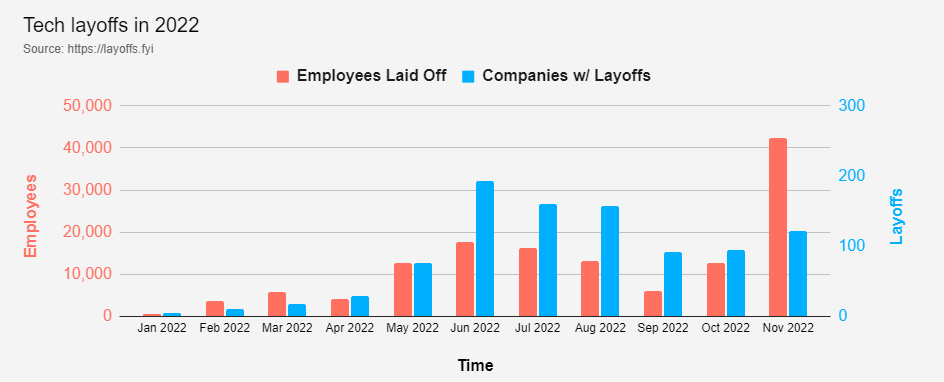Fintech firms in ASEAN are not unaffected by the employment cuts hitting the headlines this year. Compared to 2021, when the industry was flushed with record funding and mass hiring, 2022 completely flipped the script and ended with belts tightened and a series of layoffs. Yet, such upheaval could be a spark that could ignite a world changer.
Eight major tech companies in Southeast Asia have recently let go of their staff, including Sea’s e-commerce arm Shopee, which laid off more than 7,000 employees. Recently, the company made headlines for withdrawing multiple job offers based in Singapore.
Meanwhile, Singaporean crypto lender Hodlnaut fired 40 people amounting to 80 percent of its staff, and Grab, the largest ride-hailing startup in Southeast Asia, laid off 360 employees last week. In addition, Singaporean digital wealth manager StashAway let go of 31 employees.
Across the shore, Malaysian online shopping platform iPrice retrenched one-fifth of its workforce in June. In a company statement, the Indonesian education tech company Zenius has dismissed than 200 employees, while fintech startup LinkAja has also laid off hundreds of workers earlier in the year.
Meanwhile, Indonesian GoTo Group recently laid off 1,300 employees and including those in Singapore, in bid to curb costs and reach financial self-sufficiency.
In an email to the staff, GoTo group chief executive Andre Soelistyo said “it pains me to say that, as a result of our organizational review, we have to part ways with some of you”.
This has shocked many in the region, as tech had been one of the few bright spots in the economy. Yet, such upheaval could be a spark that could ignite a world changer.
New beginnings are often disguised as painful endings—a quote attributed to ancient Chinese philosopher Lao Tzu which still rings fresh to this day.
There is no shortage of feelings of anguish shared on social media posts by those who were let go from their companies. If the callousness of some CEOs is just distressing to read, imagine being at the receiving end of it. Thankfully, there are still plenty of people who help to restore faith in humanity.
Restoring the faith of jobless fintech workers
For example, Day One Ventures and Barclays were recently in the news for their programmes for jobless tech workers. Day One Ventures is set to invest US$100,000 in seed funding in 20 people, turning them into start-up founders through its “Funded Not Fired” program. Barclays is again opening applications to its “Rise Start-Up Academy” to find, fund, and nurture aspiring entrepreneurs.
ASEAN budding fintech founders can start looking at initiatives such as alternative funding through the Malaysia Co-investment Fund (MyCIF) and Malaysia Digital Economy Corporation (MDEC) or grants from the Monetary Authority of Singapore (MAS) and Singapore Fintech Association (SFA).
The Southeast Asian Association is keen to boost its micro, small and medium-sized enterprises (MSMEs), which is made up over 97 percent of all firms, 85 percent of the labour force, and about 45 percent of the gross domestic product (GDP).
The region’s strategy to expand its MSMEs’ access to markets includes increasing their digital technologies adoption, upskilling and reskilling employees; making innovation and entrepreneurship more inclusive; supporting their green transformation; improving their financial sustainability; and strengthening their innovation capacity.
Entering the fintech space with skills and solutions
Clearly, there is room for laid-off tech workers to enter the space with their skills and solution-creating acumen. With Timor-Leste and its nearly 1.4 million people admitted in principle as ASEAN’s 11th member, that would be another arena of untapped potential.
A UOB report on FinTech in ASEAN 2022 wrote: “As an emerging market, there are still many industries in Southeast Asia that need to be digitised, such as education, healthcare, agriculture, property, and logistics.
Fintechs play an essential role in supporting SMEs from these largely untapped segments in finding new business opportunities and staying competitive in the digital age. Building a portable, secure fintech product that can be scaled across multiple industries quickly will open doors for profitable partnerships.
“When it comes to fintech, we believe that the use cases and applications will expand beyond fintech companies themselves, making open finance a critical movement in the region and fintech a key part of many non-fintech business models as they scale,” Tan Yinglan, founding managing partner at Insignia Ventures Partners, was quoted as saying in the UOB report.
A Clarify Capital study found that 63 percent of tech workers have started their own company after being laid off, with 40 percent coming up with their idea between six and 12 months after leaving their job. Unsurprisingly, the beginning could be challenging, with 70 percent saying they had entrepreneurial remorse. However, the leap could pay off, with the now-business owners making an average of US$13,000 more per year.
Entrepreneurship is a pathway
Entrepreneurship was also a path that Nokia planned as part of its Bridge programme to prepare its employees to transition following a restructuring in 2011. The employees were given five paths as options for their next move. First was to find another job at Nokia, with a selection committee forming to decide who would be retained.
The second was to find another job outside Nokia, with the employees being offered outplacement services such as career coaching, resume workshop, and networking events. The third was to start a new business where employees got two months to prepare their business proposals, with support like coaching and mentoring and win grants up to US$29,832 (€25,000).
The fourth was to learn new skills through training grants for business management and a variety of trade-school courses. Finally, the fifth was for the employees to accomplish their goals with the company’s financial support.
Meanwhile, PASTI BISA is a programme launched by East Ventures, an Indonesian-focused venture capital firm, to help those affected by recent layoffs in the tech ecosystem.
Dubbed Maju Terus Pantang Mundur (IDPB MTPM), it provides an opportunity for aspiring entrepreneurs to develop their business ideas and take their first step in creating a startup.
“Thousands of talents within the tech ecosystem were laid off. We believe that the impacted talents have great potential, yet they are just at an unfortunate time and condition.
To keep them unleashing their potential, East Ventures wants to create a platform to support those individuals impacted through Indonesia PASTI BISA Maju Terus Pantang Mundur.” said Willson Cuaca, Co-founder and Managing Partner at East Ventures.
Light at the end of the tunnel
Yes, there could be a better way for companies to plan their layoffs instead of sending emails or via Zoom.
With fintech expecting funding to slow down with the return to face-to-face normalcy instead of virtual living, cost of living struggles with inflation and higher interest rates, and other geopolitical issues and climate change impacts, more layoffs could be on the horizon.
However, there is light at the end of the tunnel for those who were let go. As the saying goes, when one door closes, another opens.
Featured image credit: Edited from Freepik











